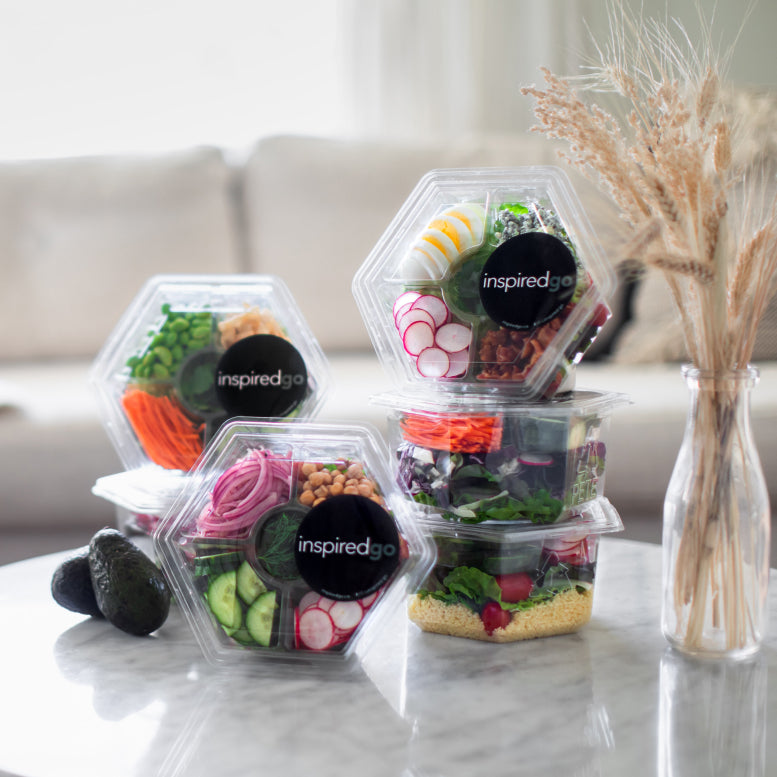Why Are Vegan Salads Helpful For Energy Levels?
Table of Contents
1. Boosting Energy Levels with Vegan Salads
2. Are Vegan Salads Filling Enough for a Complete Meal?
3. Do Salads Support Your Digestive System?
4. What Sets Inspired Go’s Vegan Salads Apart from Other Options?
1. Boosting Energy Levels with Vegan Salads
Incorporating vegan salads into your lifestyle can be a game-changer for your energy levels. These nutrient-dense meals are packed with a variety of fruits, vegetables, grains, and legumes, all of which are known for their energy-boosting properties. The complex carbohydrates found in these ingredients provide a steady release of energy, preventing the midday slump often associated with processed foods. Additionally, vegan salads are rich in vitamins and minerals essential for optimal body function. For instance, B vitamins, commonly found in leafy greens and whole grains, play a crucial role in converting food into energy. Moreover, the high fiber content of vegan salads aids in maintaining stable blood sugar levels, which in turn helps sustain consistent energy levels throughout the day. So, not only do vegan salads aid in promoting overall health and well-being, but they also contribute significantly to enhancing energy levels.
Order fresh salads today →


2. Are Vegan Salads Filling Enough for a Complete Meal?
A common misconception is that vegan salads leave you hungry, but when designed thoughtfully, they can be as hearty and satisfying as any traditional meal. A well-structured vegan salad balances fiber-rich vegetables with plant-based proteins like chickpeas, tofu, or lentils, along with healthy fats from seeds, nuts, or olive oil-based dressings. These components work together to deliver sustained energy, reduce cravings, and keep you feeling full for hours without unnecessary heaviness. Whole grains or legumes included in some recipes add complex carbohydrates that further enhance satiety and provide a steady source of fuel throughout the day. The combination of fiber, protein, and healthy fats also helps stabilize blood sugar levels, preventing energy crashes. Choosing salads with nutrient-dense ingredients ensures you meet your calorie needs while supporting optimal digestion and overall vitality.
Choose your salads and schedule delivery →
3. Do Salads Support Your Digestive System?
Salads are naturally rich in dietary fiber, which is essential for maintaining a healthy gut microbiome and smooth digestion. Leafy greens, legumes, and whole grains feed beneficial bacteria in the intestines, improving nutrient absorption and reducing bloating or discomfort after meals. Prebiotic foods often included in vegan salads, such as asparagus, onions, and garlic, further support gut flora balance, enhancing long-term digestive health. This fiber-rich combination also helps regulate bowel movements, prevents constipation, and supports a healthy metabolism. The high water content of fresh vegetables adds hydration to the digestive process, making it easier for your body to process food efficiently. Regularly eating salads can lead to better nutrient uptake and a stronger foundation for overall health.
Get fresh salads and snacks delivered →
4. What Sets Inspired Go’s Vegan Salads Apart from Other Options?
Not all vegan salads are created equal, and Inspired Go takes plant-based meals to the next level with thoughtfully designed recipes and premium sourcing. We prioritize local, seasonal produce to maximize both flavor and nutrient density, pairing it with plant-based proteins, complex carbs, and healthy fats for truly balanced meals. Our salads are portion-controlled to help you stay on track with your nutrition goals, and every option is clearly labeled for transparency and peace of mind. Unlike quick-serve or store-bought salads that can feel repetitive or lacking in substance, Inspired Go’s dishes are chef-crafted for taste, texture, and long-lasting satisfaction. Each delivery brings you fresh, convenient meals that make vegan eating something you crave, not compromise on, giving you variety, flavor, and nutrition you can rely on day after day.
Try our fresh, ready-to-eat salads →
Frequently Asked Questions
The most nutritious salad greens are dark leafy varieties like spinach, kale, and arugula. These greens are packed with essential vitamins, including A, C, and K, as well as minerals like calcium and iron. Kale is particularly rich in antioxidants, while spinach offers significant amounts of folate and magnesium. Choosing a mix of dark greens enhances both the flavor and nutritional value of your salad.
A healthy salad includes a balance of nutrient-dense ingredients like leafy greens, fresh vegetables, lean proteins, and healthy fats. For example, a base of spinach and kale, paired with grilled chicken, cherry tomatoes, avocado, and a light olive oil dressing, creates a wholesome meal. Avoid fried toppings or sugary dressings, as they add empty calories, and opt for natural ingredients to maximize nutrition.
Yes, eating salad daily is a healthy habit when it includes a variety of fresh, nutrient-rich ingredients. Salads offer fiber for digestion, antioxidants for immunity, and essential nutrients like potassium and folate. Regularly eating salads can support weight management and improve energy levels. To avoid monotony, vary your greens, proteins, and toppings to keep meals satisfying and nutritionally balanced.
Healthy salad dressings are typically made with simple, natural ingredients. Olive oil-based dressings, paired with balsamic vinegar or fresh lemon juice, provide healthy fats and enhance flavor without unnecessary calories. Avoid store-bought dressings with high sugar or preservatives. For a creamy alternative, opt for homemade dressings using Greek yogurt or avocado for added nutritional benefits.
Yes, salads are incredibly beneficial for overall health when prepared with fresh, whole ingredients. They are low in calories and high in vitamins, minerals, and antioxidants, supporting heart health, digestion, and immunity. Adding a mix of proteins and healthy fats creates a satisfying, nutrient-dense meal. Regularly incorporating salads into your diet can promote long-term well-being and energy.

